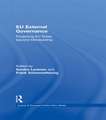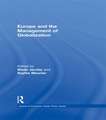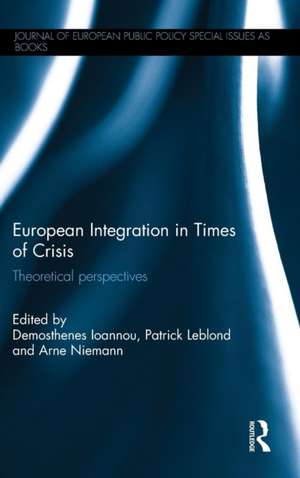European Integration in Times of Crisis: Theoretical perspectives: Journal of European Public Policy Series
Editat de Demosthenes Ioannou, Patrick Leblond, Arne Niemannen Limba Engleză Hardback – 4 sep 2015
In order to improve our understanding of a discussion that has oscillated between fears of EA disintegration on the one hand and the concrete advancement of integration during the crisis on the other, this special collection brings together leading scholars of European integration who apply key theoretical approaches – from liberal intergovernmentalism and neofunctionalism to other prominent theoretical accounts that have been applied to European integration such as historical institutionalism, critical political economy, normative theory, and a public opinion approach – to the economic and financial crisis. The contributions seek to analyse, understand and/or explain the events that occurred and the (re)actions to them in order to draw conclusions concerning the applicability and usefulness of their respective theoretical perspectives.
This book was published as a special issue of the Journal of European Public Policy.
| Toate formatele și edițiile | Preț | Express |
|---|---|---|
| Paperback (1) | 323.23 lei 6-8 săpt. | |
| Taylor & Francis – 7 iun 2017 | 323.23 lei 6-8 săpt. | |
| Hardback (1) | 668.00 lei 6-8 săpt. | |
| Taylor & Francis – 4 sep 2015 | 668.00 lei 6-8 săpt. |
Din seria Journal of European Public Policy Series
-
 Preț: 309.70 lei
Preț: 309.70 lei -
 Preț: 256.53 lei
Preț: 256.53 lei -
 Preț: 379.30 lei
Preț: 379.30 lei - 18%
 Preț: 998.56 lei
Preț: 998.56 lei - 18%
 Preț: 1160.47 lei
Preț: 1160.47 lei - 16%
 Preț: 248.15 lei
Preț: 248.15 lei -
 Preț: 407.19 lei
Preț: 407.19 lei -
 Preț: 118.49 lei
Preț: 118.49 lei -
 Preț: 362.05 lei
Preț: 362.05 lei -
 Preț: 407.40 lei
Preț: 407.40 lei -
 Preț: 408.54 lei
Preț: 408.54 lei - 26%
 Preț: 763.78 lei
Preț: 763.78 lei - 18%
 Preț: 1162.25 lei
Preț: 1162.25 lei -
 Preț: 407.57 lei
Preț: 407.57 lei - 18%
 Preț: 997.90 lei
Preț: 997.90 lei - 18%
 Preț: 1000.51 lei
Preț: 1000.51 lei -
 Preț: 190.51 lei
Preț: 190.51 lei -
 Preț: 408.54 lei
Preț: 408.54 lei -
 Preț: 462.85 lei
Preț: 462.85 lei -
 Preț: 407.57 lei
Preț: 407.57 lei - 13%
 Preț: 334.06 lei
Preț: 334.06 lei - 18%
 Preț: 1160.32 lei
Preț: 1160.32 lei - 26%
 Preț: 762.97 lei
Preț: 762.97 lei - 27%
 Preț: 182.60 lei
Preț: 182.60 lei - 18%
 Preț: 996.33 lei
Preț: 996.33 lei - 18%
 Preț: 999.02 lei
Preț: 999.02 lei - 17%
 Preț: 184.81 lei
Preț: 184.81 lei - 15%
 Preț: 697.70 lei
Preț: 697.70 lei - 18%
 Preț: 1160.83 lei
Preț: 1160.83 lei -
 Preț: 370.46 lei
Preț: 370.46 lei - 26%
 Preț: 764.34 lei
Preț: 764.34 lei - 26%
 Preț: 764.87 lei
Preț: 764.87 lei - 17%
 Preț: 184.81 lei
Preț: 184.81 lei - 28%
 Preț: 495.57 lei
Preț: 495.57 lei - 16%
 Preț: 234.90 lei
Preț: 234.90 lei - 26%
 Preț: 763.78 lei
Preț: 763.78 lei - 31%
 Preț: 762.97 lei
Preț: 762.97 lei -
 Preț: 416.22 lei
Preț: 416.22 lei - 18%
 Preț: 1054.71 lei
Preț: 1054.71 lei
Preț: 668.00 lei
Preț vechi: 785.88 lei
-15% Nou
Puncte Express: 1002
Preț estimativ în valută:
127.84€ • 132.97$ • 105.54£
127.84€ • 132.97$ • 105.54£
Carte tipărită la comandă
Livrare economică 15-29 aprilie
Preluare comenzi: 021 569.72.76
Specificații
ISBN-13: 9781138934900
ISBN-10: 1138934909
Pagini: 156
Dimensiuni: 156 x 234 x 11 mm
Greutate: 0.4 kg
Ediția:1
Editura: Taylor & Francis
Colecția Routledge
Seria Journal of European Public Policy Series
Locul publicării:Oxford, United Kingdom
ISBN-10: 1138934909
Pagini: 156
Dimensiuni: 156 x 234 x 11 mm
Greutate: 0.4 kg
Ediția:1
Editura: Taylor & Francis
Colecția Routledge
Seria Journal of European Public Policy Series
Locul publicării:Oxford, United Kingdom
Cuprins
1. European integration and the crisis: practice and theory 2. Liberal intergovernmentalism and the euro area crisis 3. European economic integration in times of crisis: a case of neofunctionalism? 4. A historical institutionalist explanation of the EU’s responses to the euro area financial crisis 5. Public opinion and the crisis: the dynamics of support for the euro 6. Political legitimacy and European monetary union: contracts, constitutionalism and the normative logic of two-level games 7. Europe’s ordoliberal iron cage: critical political economy, the euro area crisis and its management
Descriere
Few events over the past few decades have given rise to an amount of debate and speculation concerning the state of the European Union and the future of European integration as the economic and financial crisis that began in 2007. The contributions in this book, using various theoretical lenses on European integration, explain why Europe’s Economic and Monetary Union did not implode as a result of the crisis but further integrated instead.
This book was published as a special issue of the Journal of European Public Policy.
This book was published as a special issue of the Journal of European Public Policy.
















